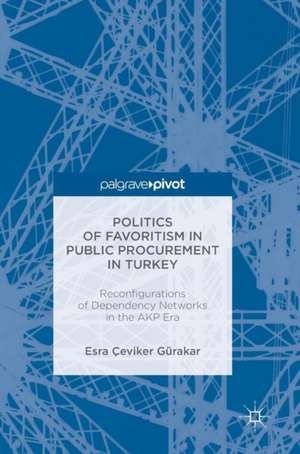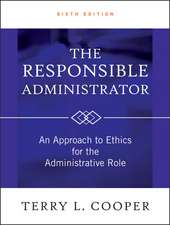Politics of Favoritism in Public Procurement in Turkey: Reconfigurations of Dependency Networks in the AKP Era: Reform and Transition in the Mediterranean
Autor Esra Çeviker Gürakaren Limba Engleză Hardback – 27 iul 2016
| Toate formatele și edițiile | Preț | Express |
|---|---|---|
| Paperback (1) | 411.32 lei 6-8 săpt. | |
| Palgrave Macmillan US – 24 iul 2018 | 411.32 lei 6-8 săpt. | |
| Hardback (1) | 420.02 lei 6-8 săpt. | |
| Palgrave Macmillan US – 27 iul 2016 | 420.02 lei 6-8 săpt. |
Preț: 420.02 lei
Nou
Puncte Express: 630
Preț estimativ în valută:
80.37€ • 84.21$ • 66.44£
80.37€ • 84.21$ • 66.44£
Carte tipărită la comandă
Livrare economică 11-25 aprilie
Preluare comenzi: 021 569.72.76
Specificații
ISBN-13: 9781137592750
ISBN-10: 1137592753
Pagini: 129
Ilustrații: XV, 127 p. 19 illus. in color.
Dimensiuni: 155 x 235 x 14 mm
Greutate: 0.39 kg
Ediția:1st ed. 2016
Editura: Palgrave Macmillan US
Colecția Palgrave Macmillan
Seria Reform and Transition in the Mediterranean
Locul publicării:New York, United States
ISBN-10: 1137592753
Pagini: 129
Ilustrații: XV, 127 p. 19 illus. in color.
Dimensiuni: 155 x 235 x 14 mm
Greutate: 0.39 kg
Ediția:1st ed. 2016
Editura: Palgrave Macmillan US
Colecția Palgrave Macmillan
Seria Reform and Transition in the Mediterranean
Locul publicării:New York, United States
Cuprins
1. Introduction and Overview.- 2. Politics of Government-Business Relations in Turkey: Deep-Rooted Structures and New Tensions.- 3. Political Economy of Reform and Backlash in the Public Procurement System: Third Party Enforcement vs. the Political Settlement in Turkey.- 4. Redistribution or Crony Capitalism? Favoritism in Public Procurement Contract Award Processes.- 5. Conclusion.
Recenzii
“Politics of Favoritism in Public Procurement in Turkey sheds new light into an important aspect of contemporary Turkish politics that has received only scant scholarly attention. In particular, the empirical evidence presented in the book on the firms that succeeded in winning the procurement contracts makes an original contribution to the literature. The book will be especially useful for those interested in political favoritism, clientelism, and patronage in Turkey.” (Sabri Sayarı, Middle East Journal, Vol. 72 (3), 2018)
Notă biografică
Esra Çeviker Gürakar is Assistant Professor at the Faculty of Economics and Business Administration at Okan University, Istanbul, Turkey. Her research focuses on political economy, institutional economics, and law and economics. Her recent papers on public procurement in Turkey include “Business Networks and Public Procurement in Turkey”, “Political Connections and Public Procurement in Turkey: Evidence from the Construction Work Contracts” and “Does Public E-Procurement Deliver What It Promises? Empirical Evidence from Turkey.” She can be contacted at esragurakar@gmail.com.
Textul de pe ultima copertă
This book provides substantiation to claims of favoritism in public procurement in Turkey in the twenty-first century. Through an analysis of nearly fifty thousand high value contracts between 2004 and 2011, the study indicates that the AKP majority government has used public procurement as an influential tool to increase its electoral success, build its own elites, and finance politics. The use of public procurement for rent creation and distribution is found to be particularly extensive in the construction and services sectors–namely in the TOKİ projects and municipal procurements. In addition, this book demonstrates how the more than 150 legal amendments to the new Public Procurement Law in Turkey, drafted with the pull of the European Union-International Monetary Fund-World Bank nexus, have increased the use of less competitive procurement methods and discretion in awarding contracts. Relying on empirical research, this timely book provides careful, quantitative analysis of datasets in its contentions of favoritism in Turkey’s public procurement process.
























